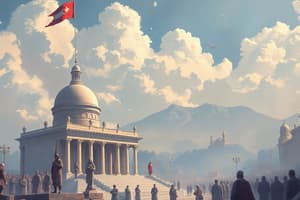Podcast
Questions and Answers
What is a polity primarily defined as?
What is a polity primarily defined as?
- A set of cultural beliefs and values.
- An economic system for resource distribution.
- A statistical method for political analysis.
- A structured form of political organization or governance. (correct)
Which of the following best describes a city-state?
Which of the following best describes a city-state?
- A small independent area consisting of a city and its surrounding territory. (correct)
- A federation of self-governing regions.
- A politically unified group of various states.
- A large nation with multiple cities.
What is one function of a polity related to law?
What is one function of a polity related to law?
- Providing educational programming.
- Conducting economic transactions.
- Encouraging social movements.
- Establishing and enforcing laws to maintain social order. (correct)
Which feature of polities involves the recognized right to govern?
Which feature of polities involves the recognized right to govern?
What type of polity is characterized by a union of partially self-governing states under a central government?
What type of polity is characterized by a union of partially self-governing states under a central government?
Which factor is NOT mentioned as influencing the evolution of polities?
Which factor is NOT mentioned as influencing the evolution of polities?
What contemporary issue challenges state sovereignty and local governance?
What contemporary issue challenges state sovereignty and local governance?
Which type of polity describes a union formed for mutual benefit or defense?
Which type of polity describes a union formed for mutual benefit or defense?
Flashcards are hidden until you start studying
Study Notes
Definition of Polity
- A polity is a structured form of political organization or governance.
- It encompasses different types of political entities, including states, nations, and communities.
Types of Polities
-
Sovereign States
- Independent political entities with defined territories and governments.
-
City-States
- Small independent areas that consist of a city and its surrounding territory.
-
Empires
- Extensive groups of states or countries under a single supreme authority, often an emperor.
-
Federations
- Political entities characterized by a union of partially self-governing states or regions under a central government.
-
Confederations
- A union of sovereign groups or states, often formed for mutual benefit or defense.
-
Nations
- A group of people sharing common cultural characteristics or identity, which may or may not have political sovereignty.
Key Features of Polities
-
Governance Structure
- Refers to the organization of authority and the system of rules and laws.
-
Political Culture
- The collective attitudes, beliefs, and values that shape the political behavior within a polity.
-
Legitimacy
- The recognized right to govern, which can stem from legal frameworks, tradition, or the consent of the governed.
-
Political Participation
- The ways in which citizens engage in politics, including voting, activism, and public discourse.
Functions of Polities
-
Law and Order
- Establishing and enforcing laws to maintain social order.
-
Public Goods Provision
- Supplying essential services such as education, healthcare, and infrastructure.
-
Conflict Resolution
- Mechanisms for mediating disputes and managing conflicts within the polity.
-
Representation
- Ensuring that diverse groups within the polity have a voice in decision-making processes.
Evolution of Polities
- Polities evolve through historical processes, influenced by factors such as:
- War and conquest
- Colonization and decolonization
- Economic changes
- Social movements and revolutions
Contemporary Issues in Polities
-
Globalization
- Impact on state sovereignty and local governance.
-
Nationalism
- Rise of identity politics and the challenge to existing political structures.
-
Democratic Governance
- Challenges in maintaining democracy, including populism and authoritarianism.
-
Environmental Governance
- Addressing climate change and sustainable development within political frameworks.
Definition of Polity
- A polity represents a structured system of political organization and governance, incorporating various political entities.
Types of Polities
- Sovereign States: Defined territories owned by independent political entities with their own governments.
- City-States: Independent urban areas that consist of a city along with its surrounding territory.
- Empires: Large political units encompassing multiple states or nations under a singular supreme authority, often ruled by an emperor.
- Federations: Political systems where partially self-governing regions or states unite under a central governing authority.
- Confederations: Alliances of sovereign states formed for mutual benefit or collective defense.
- Nations: Groups sharing common cultural traits or identity, which might not necessarily possess political sovereignty.
Key Features of Polities
- Governance Structure: Organization of authority and establishment of laws within a polity.
- Political Culture: Collective attitudes, beliefs, and values influencing political behavior in a specific polity.
- Legitimacy: The acknowledged right to govern, rooted in legal systems, tradition, or the consent of the governed.
- Political Participation: Diverse methods employed by citizens to engage in politics, such as voting, activism, and public discussions.
Functions of Polities
- Law and Order: Creation and enforcement of laws to sustain social stability and order.
- Public Goods Provision: Delivery of essential services like education, healthcare, and infrastructure for public welfare.
- Conflict Resolution: Systems designed for mediating disputes and addressing conflicts among citizens.
- Representation: Mechanisms ensuring that various groups within a polity have a say in decision-making processes.
Evolution of Polities
- Polities undergo evolution shaped by significant historical factors such as:
- War and conquest leading to shifts in power dynamics.
- The processes of colonization and subsequent decolonization movements.
- Economic transformations impacting political structures.
- Social movements and revolutions that instigate political change.
Contemporary Issues in Polities
- Globalization: Affects state sovereignty and challenges local governance structures.
- Nationalism: Emergence of identity politics posing challenges to existing political frameworks.
- Democratic Governance: Struggles to uphold democracy amid trends like populism and authoritative regimes.
- Environmental Governance: Challenges of integrating climate change and sustainability issues into political decision-making.
Studying That Suits You
Use AI to generate personalized quizzes and flashcards to suit your learning preferences.




